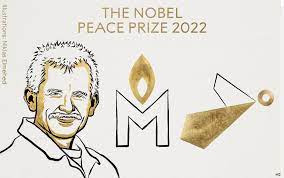Peace, Prize, politics: On 2022 Peace Nobel
The Nobel can strengthen the voices of peace and human rights globally
By choosing a Belarusian human rights campaigner and two civil liberty-focused organisations from Ukraine and Russia for this year’s Nobel Prize for Peace, the Norwegian Committee has once again offered its redoubtable support for voices that are critical of the authoritarianism and militarism of Moscow and its allies. This is the second year in a row that Russians who demand accountability and respect for human rights from authorities have been chosen for the Prize. In 2021, Dmitry Muratov, editor-in-chief of the Russian Novaya Gazeta, one of the few independent newspapers in Vladimir Putin’s Russia, was a co-winner of the Prize for his “efforts to safeguard freedom of expression”. This year, Memorial, an organisation that has been documenting alleged state abuses in Russia since 1987, shared the Prize with Ales Bialiatski, the Belarusian activist, and the Center for Civil Liberties (CCL) in Ukraine. Memorial is one of the few independent NGOs in Russia that continue to demand accountability from the country’s rulers. It has a database of both the victims and perpetrators of state abuses that date back to the Stalin era. Mr. Bialiatski, who is the founder of the rights group called Viasna (Spring), has been campaigning for democracy in Belarus since the 1980s. The CCL, which was founded to promote democracy in Ukraine, is known for documenting Russia’s alleged war crimes in Ukraine.
Of the three recipients, Mr. Bialiatski and Memorial continue to face the wrath of the state. Mr. Bialiatski was jailed from 2011 to 2014 by the regime of Aleksandr Lukashenko. When street protests broke out across the country in 2020 after the disputed presidential election in which Mr. Lukashenko “won” a sixth term, authorities arrested Mr. Bialiatski again. He is currently in jail without trial. Memorial, founded in the Soviet Union’s internal reform period, has had several run-ins with the Putin administration. Last year, the NGO was disbanded by a Moscow court and last week, a judge ruled in favour of the seizure of the organisation’s office by the authorities. CCL, founded in 2007, rose to prominence in Ukraine’s 2014 pro-western Maidan protests that brought down the pro-Russian government of Viktor Yanukovych. Since the February 24 Russian invasion of Ukraine, the CCL has been documenting Russia’s alleged atrocities. The Peace Prize has often been criticised as a political award shorn of credibility, but it could strengthen the voices of peace and human rights globally
